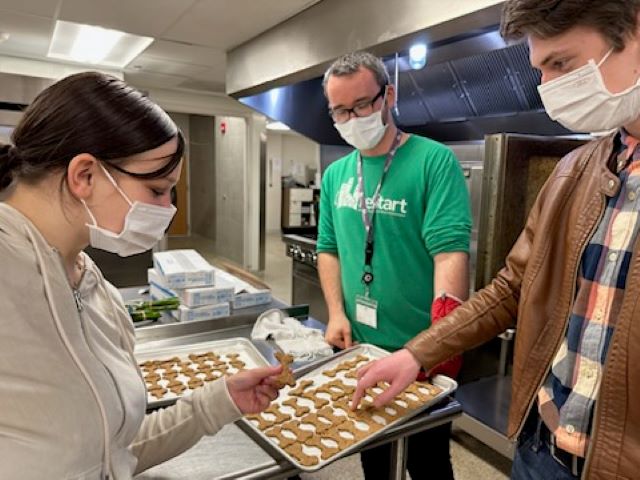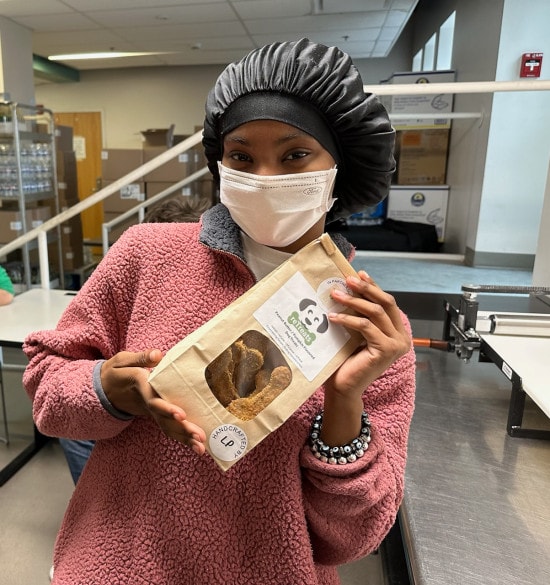Dog Treats Help Unhoused Youth ReStart Their Lives reTreats Offer Sustenance for Both Pets and People
Published December 1st, 2022 at 6:00 AM
Above image credit: Older Youth Case Manager Joe Brecht shares samples of reTreats gourmet dog treats at The City Market on a Sunday morning. (Jill Wendholt Silva | Flatland)A nutty whiff of peanut butter mingled with the bready aroma of barley mash wafts from the ovens at reStart, a nonprofit social service agency located at 918 E. 9Th St. offering shelter to Kansas City’s homeless.
These handcrafted, gourmet dog treats smell like peanut butter cookies but are shaped like bones. The all-natural ingredient list includes whole wheat flour, natural peanut butter, pureed pumpkin, egg product and Crane Brewing’s spent grains, a byproduct of the brewing process.
“They kind of taste like a graham cracker a little bit, but without the sweetness. They seem nasty, but they’re really not. It’s all edible ingredients,” says Charly, 20, a reStart resident who participates in a job training program for at-risk youth known as reTreats.
The program kicked off in 2020 and enrolls three employees at a time. Funding is provided by Jackson County COMBAT and the Health Forward Foundation, and participants receive a stipend to work 9 a.m. to noon three days per week.

Making dog treats provides skills in culinary training, product marketing, customer service, accounting and bookkeeping. Pets are not allowed at reStart due to a lack of space, so the final recipe was chosen by a taste test panel of staff members’ dogs.
Ruby, a 5-year-old Doberman-pitbull mix adopted from Midwest Animal ResQ in Raytown, is reportedly a fan of reTreats. “And she’s surprisingly picky for a dog that has been starved,” says Chris Meyers, a veterinarian-turned-brewer who founded Crane Brewing.
The reTreats collaboration is Crane Brewing’s third dog treat venture, but it’s also been the most successful because “they’ve had the best communication and flexibility,” Meyers says.
The dog treats are made in two sizes for large ($8) and small dogs ($4) and sold at Crane’s Raytown brewery, Waldo Pizza, Fareway Meat Market and Game Café, as well as the City Market and Brookside Farmers Market. For every five bags sold, one bag is donated to the Pet Resource Center of Kansas City.
“Initially, we thought online would be our biggest sales, but in-person sales are most successful because in-person allows us to tell the story,” says Jonathan Roberts, reStart’s chief operating officer.
Despite a compelling story, Roberts insists the job training program is only sustainable if its employees are producing a high-quality product that dog owners want to buy more than once.
“We didn’t want people to buy dog treats from us just because we told them a sad story. We didn’t want the teens to be stigmatized or tokenized,” Roberts says. “It needed to be a legit business.”
Healing Powers
As Charly levels the dough with a compact tabletop sheeter, a device that ensures a uniform thickness, her story unfolds.
After fleeing a verbally abusive “houseful of addicts,” she and her boyfriend lived in a car and slept outdoors while she was pregnant. After the birth of their now 5-month-old daughter, they lived in hot, cramped conditions and Charly became fearful of losing custody if she couldn’t provide stable living conditions.
Charly currently lives at reStart and she previously enrolled in reTreats but dropped out because her daughter would not take a bottle.
“She’s one of my best workers,” says Older Youth Case Manager Joe Brecht.
Traditional 9-to-5 employment often doesn’t work well for people who have experienced trauma or deal with mental health and substance abuse issues. Brecht’s chosen supervision style recognizes homeless youth often require alternative workforce opportunities to get back on their feet.
“Honestly, the best part about the job is Joe being our manager because he is very supportive,” Charly says after taking a break from work to pump and store her breast milk. “It feels like you’re just hanging out making dog treats with your friends. It doesn’t really feel like a job. It feels super-easy, but it pays really well, and you’re always looking forward to coming to work. I’ve never had that (feeling) with a job before.”

At a table adjacent to the dough sheeter, Lucas, 18, and Ashley, 19, chat about their favorite musical groups while stamping out dog treats with cookie cutters.
Lucas was homeschooled by his adoptive parents. After graduating high school, he enlisted in the Army. He was stationed at Fort Sill in Oklahoma, but his plans for a military career were derailed when he broke his hip.
After his biological mother reached out on Facebook, Lucas decided to travel to Kansas City, only to discover she was struggling with addiction. One night while she was strung out, she came to a convenience store where Lucas was working and demanded money, a move that cost his job.
“I was out on the street for a couple of days, and I had a friend reach out to me and say, ‘Hey, check out reStart.’ Joe offered me a job here and I’ve been working here for a couple of weeks.”
Lucas is enjoying the culinary part of his job and, with the help of Steve Davis, the food services director, he is currently looking into the requirements for culinary school.
“In a place like this, you experience a lot of negativity. You’re homeless and people have this mindset that they can’t go anywhere because they’re stuck here,” he says. “I don’t have that mindset. This is a temporary residence. I’m going to stay here 18 months, save my money and get out and have a house or an apartment, and I’m going to have a car, and I want to be successful.”
Canine Kindness
Ashley, a Turner High School graduate, left the residence she was living in after witnessing gun violence.
“I was sleeping on the Nelson-Atkins benches for, like, two weeks, until someone told me about Safe Place (a safety net organization for youth),” she says.
Ashley writes poetry to stave off anxiety and she would like to get back to school to earn a nursing degree.

“I feel like I’m pretty multi-talented. I catch onto things pretty fast, and I’m very curious, so, I try to figure it out,” she says. “I don’t have any negative thoughts about this experience. I always keep thinking positively and moving forward. Like, what else can I do?”
Ashley has qualified for subsidized housing and SNAP benefits. But like many youths who find themselves homeless, her biggest hurdle to mainstream employment is lack of access to her birth certificate and Social Security card.
Early on a Sunday morning, Brecht rouses the reTreats team for their first sales outing to the City Market. The temperatures are in the 30s and customers are few and far between. When a man walks by their market stall with his service dog, Brecht asks permission to offer the dog a sample treat.
It’s gone in one slobbery gulp.
Eighty percent of reStart residents successfully transition to permanent housing, and all reTreats graduates have found employment.
Charly knows what it’s like to grow up with pets. She grew up with a pitbull named Sancho and a husky named Gracie.
“I’ve had a few dogs, and I love them, and whenever we’re out of reStart and in our own place I would love to get my daughter a dog to grow up with,” she says.
Jill Wendholt Silva is a James Beard award-winning food editor and freelance writer. In the past, she has consulted with Chewology and Red Kitchen KC. You can follow Silva at @jillsilvafood.


